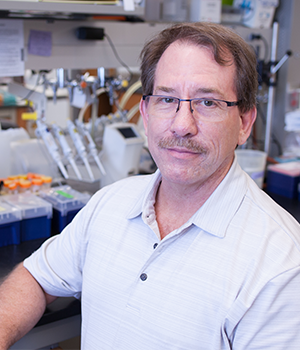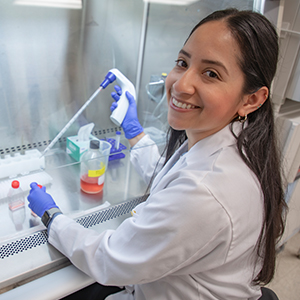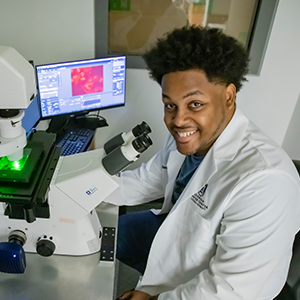From Collaborative Research
To Life-Saving Discoveries
- Augusta University
- The Graduate School
- Biomedical Sciences
- Biochemistry & Cancer Biology
Biochemistry & Cancer Biology
At Augusta University, the Biochemistry and Cancer Biology (BCB) PhD program empowers you to lead life-changing, life-saving research in cancer and molecular biology. Building on the university’s strengths in interdisciplinary collaboration, you'll explore the complexities of cancer through a curriculum grounded in biochemistry, pharmacology, immunology, and genetics. While you have research opportunities, cancer biology remains a central focus—driven by collaborative teams tackling one of the world’s most urgent health challenges. As a BCB student, you’ll thrive in a supportive environment with access to cutting-edge facilities and world-class faculty, gaining the experience needed to advance cancer care and biomedical science. Graduates go on to make significant contributions to cancer research and therapy development through postdoctoral fellowships, academic faculty positions, pharmaceutical companies, and biotech startups and more.
Ready to lead the next breakthrough in cancer research? Join the BCB PhD program and turn your passion into discoveries that save lives.
Admissions Contact
Lauren Schoem, MS
Assistant Director, Graduate School Admissions
(706) 721-9516
BIOMED@augusta.edu
Program Director
Meet Current Students | Explore Faculty Research

"Each student who joins the BCB program becomes a part of a family that works together to ensure that students are not only successful, but enjoy the journey."
Program Contact
Darren Browning, PhD
Program Director
dbrowning@augusta.edu
Student Testimonials

- Karina Aguilar

"My career goal is to become a PI investigating ways to reduce the harmful effects of Radiation on Astronauts in space."
- Dominique Monroe
The Graduate School
The Graduate School at Augusta University facilitates ground-breaking research and ensures outstanding education. We create an environment that embraces and empowers the next generation of scholars and investigators, supports faculty and staff, and fosters meaningful relationships and collaborations among students across our programs and colleges.
Explore More